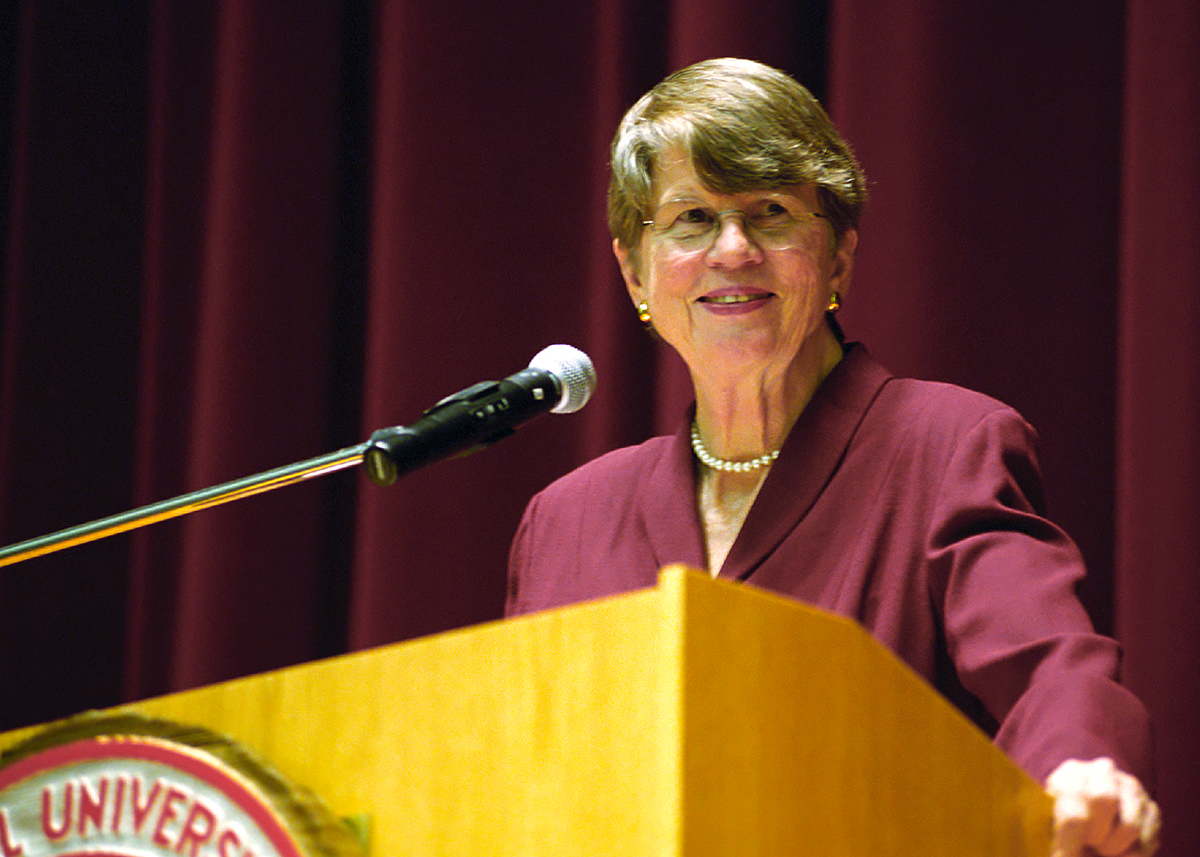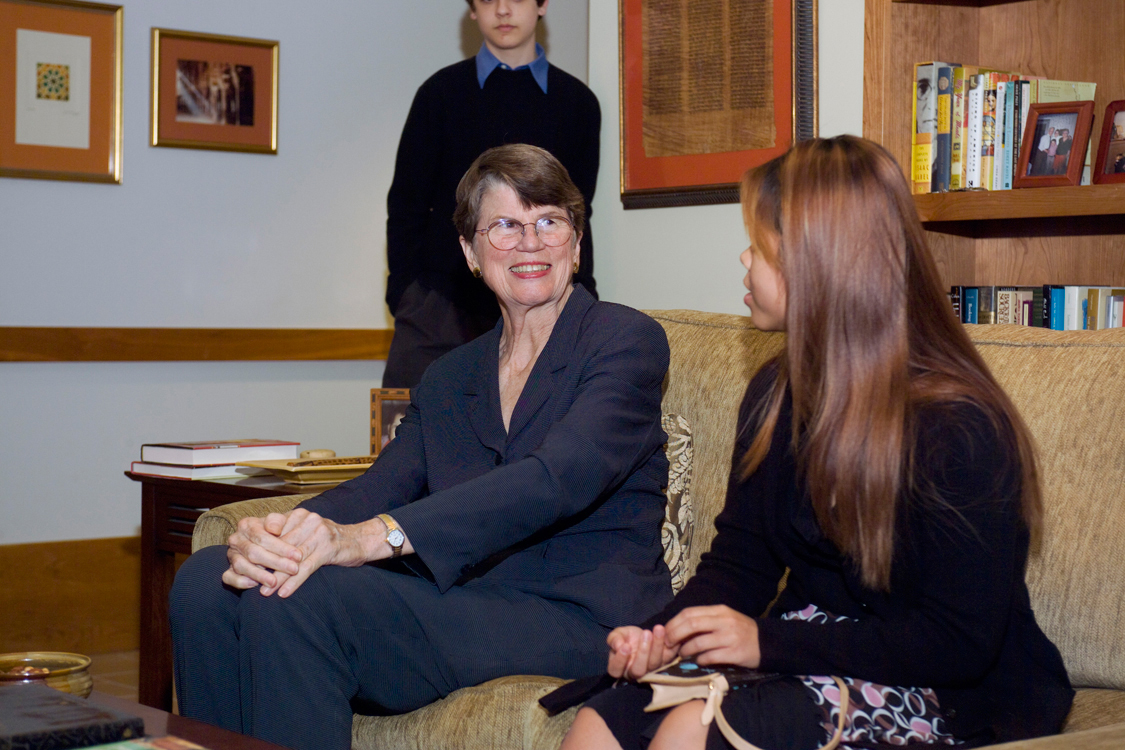Janet Reno '60, first female U.S. attorney general, dies at 78
By Blaine Friedlander

Janet Reno ’60, who went from leading Cornell’s Women’s Student Government Association as a student to becoming the United States’ first female attorney general, died from complications of Parkinson’s disease Nov. 7. She was 78.
As attorney general for almost eight years during President Bill Clinton’s administration, Reno directed the world’s largest justice and federal law enforcement office. She was the longest-serving attorney general since before the Civil War.
“Throughout her pioneering career in Miami and in Washington, Janet Reno distinguished herself by remaining true to her principles and to herself. Janet’s integrity, intelligence and toughness quelled critics’ calls for her resignation in times of roiling controversy that threatened to engulf her,” said Interim President Hunter Rawlings. “She leaves an extraordinary legacy of achievement under duress and unshakeable dignity in the face of enormous challenge. We take great pride that this singularly accomplished woman of ‘firsts,’ this Cornellian who commanded the world stage, was one of us.”
Gerald Torres, Cornell’s Jane M.G. Foster Professor of Law, served as deputy assistant attorney general under Reno. He was counsel to her on the environment and Native American issues.
“She was very proud of her Cornell connection,” Torres said. “Janet Reno was very faithful to the law. When you look at the last few attorney generals, you’ll find one who stands as the model for what an attorney general should be like – and that’s Janet Reno. She always believed that she was the lawyer for the people of the United States of America – not for a particular administration. … she took that role very seriously.”
Gretchen Ritter ’83, the Harold Tanner Dean of Arts and Sciences and professor of government, said: “Janet Reno was an extraordinary public servant – a person of immense integrity, competence and commitment. As the nation’s first female attorney general, she led the Department of Justice at a difficult time, and was both fair-minded and undaunted in her pursuit of terrorist cases in the 1990s. As a Cornell alumna, Reno was – like many of the women who preceded and followed her at Cornell – a talented striver and social pioneer, determined to make her contributions count in the arena where she could make the greatest difference.”

Reno, who graduated with a bachelor’s degree in chemistry, was the 2001 Senior Convocation speaker during Commencement Weekend and that same year was appointed a Frank H.T. Rhodes Class of ’56 Professor at Cornell for a three-year term. She also served on the President’s Council of Cornell Women.
As a Rhodes professor, she engaged the Cornell community across several disciplines. Reno participated in a symposium on “Rethinking the Criminalization of Youth” and lectured on the impact of the presidential election on violence against women in the U.S. She joined class discussions in the Department of Government, the Department of Policy Analysis and Management in the College of Human Ecology and in the ILR School. During a panel discussion sponsored by the Center for the Study of Inequality, Reno joined a debate on the assimilation of ethnic minorities, and she participated in a human development forum on children’s policy.
In her Convocation address, Reno said she was honored to speak. “It was 45 years ago that I arrived, at dawn, by myself at this great institution,” she said. “I saw some of the most beautiful places that will forever be stamped on my mind … I came to a new world.”
In Reno’s half-hour extemporaneous address, she explained that Cornell’s diversity broadened her view. “The strength of Cornell to me [is that it] is a world of [the] world’s people … more diverse than anyplace I had ever been.”
As attorney general, Reno’s decision to return Cuban refugee Elian Gonzales to his father attracted notoriety and controversy. Reno told the convocation audience that while the Miami Herald newspaper attacked her decision, she felt at peace because she was preserving the boy’s right to be with his father – and a newspaper’s right to criticize it.

“I felt almost triumphant,” she told the large Barton Hall crowd. “That’s the First Amendment, and that’s the reason they came from Cuba, and [those rights] must be preserved at every possible cost.”
As an undergraduate, Reno served as president of the Women’s Student Government Association at a time when dormitories and dining halls were segregated by gender and only women generally had curfews on campus.
In October 1959, her senior year, Reno sought to end the “gracious living” at Balch and Sage halls’ dining rooms. This included mandatory waitress service, which meant higher dining hall costs for women. Undergraduate women had to sit in silence until they were formally adjourned from dinner.
“I don’t think there is such a thing as ‘gracious living,’” Reno told The Cornell Daily Sun at the time. “When meals will no longer be regulated, [the women] will be less rushed.” Four months later, Sage and Balch dining halls adopted buffet-style service.
After graduating from Cornell, she earned her J.D. from Harvard University in 1963.
Media Contact
Get Cornell news delivered right to your inbox.
Subscribe